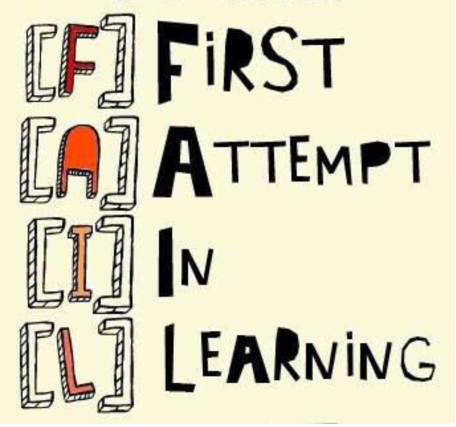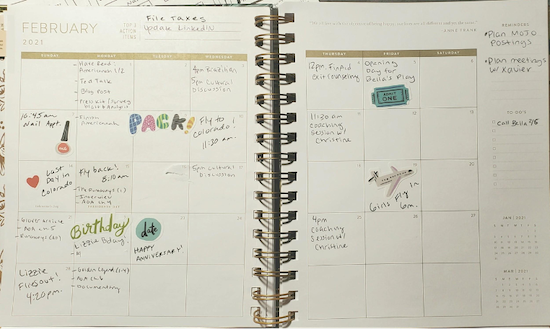You’re scheduled, very soon, to start educating yourself on a foreign culture, to navigate and prepare for your new position, and to manage your outside coursework. Meetings, classes, and deadlines splay themselves across your calendar, an unfamiliar schedule you’re excited if nervous to adhere to. Stress in the face of all this is perfectly natural.
But.
“I’m Worried I Won’t Measure Up.”
“I’m worried I won’t measure up to the previous intern.”
“I’m worried I don’t know enough to do well in this internship.”
“I’m worried I won’t like the work I’ll do.”
“I’m worried I won’t fit in with the work culture.”
“I’m worried I’ll be perceived as x, y, z.”
Interns are Green. New. Educationally but not practically experienced.
You know this, and your boss knows this too. That’s the great thing about internships, the purpose of which boils down to learning, and failing, sooner rather than later.
 |
| Photo via Pinterest |
A Story: During my first meeting with my internship abroad contact who happened to be the owner of the business, I was understandably hesitant to voice myself or any insight/opinions I’d formed. My mentality was, “he is the expert and I am a sponge.” I was half right.
During my first “pitch,” he smiled and I immediately apologized. I presumed I had a stupid idea and he was smiling waiting to tell me so. The mind can do debilitating things.
He said, “I smile simply to smile. If you have an idea, and I know where it came from, and that maybe it can work, we can try it. If not, we can discuss. If we try and it doesn’t work, we go back to the original model.”
Being faulted for getting it wrong is a matter of not having the right teacher.
Meeting people you connect with is a byproduct of an already established desire to grow.
And if there’s no one to connect with? Thankfully internships, by nature, are short term.
Takeaway: Getting it wrong, messing up, and failing in an internship will have more benefits than getting it all right. Imagine if you made those mistakes fresh at a new position! The consequences are higher. Get your failures in ASAP. Maybe you realize a month in that, hey, this isn’t for you. PHEW, you just saved yourself months, maybe years of job hunting for a position you never really wanted.
If you’re going to overthink things, put those thoughts to work.
Worried about missing a class or deadline? Overcompensate. Pull out your physical planner, phone calendar, and send a photo of your schedule to a friend. Planning doesn’t get rid of your anxiety, but it does let you know what’s appropriate to be anxious about.
“It’s a promissory note to yourself, like, ‘there’s nothing I can do about it now, so I’m going to wait until 1 August to worry about it’.” – E.J. Masicampo, associate professor of psychology at Wake Forest University.
Plan your self-care, too. If your schedule is life at a glance, it should be balanced to be accurate. The visual of a work-only calendar risks doing more harm than good. Find a new hair salon, gym, or cafe (whatever your poison may be) and plan your appointments for that too. Your future self, soon to be your present self, will thank you.
 |
| (Even if some of your schedule is TBD, having the space to put those scheduling reminders is a relieving visual you can return to and rely on.) |
Time Management Tips…. that don’t involve a good app.
The following list is half tip/half mindset. Preparing a strategy ahead of time for how to manage everything coming your way is an excellent way to relieve the stress involved with a new endeavor. If you’re like me and struggle with procrastination, distraction, and an overall phobia to productive time usage, read on.
1. Play to your strengths.
If you get your best work done between 4 p.m. and midnight, so be it. If you work best in 2 or 4 hour intervals, keep to that schedule. Don’t force yourself to get things done on someone else’s schedule, or an idea of a more ideal one (if you can avoid it). You know you best.
2. We live in the Age of Distraction. Give yourself a break, or better yet, perspective.
- You’re not avoiding work, you’re just seeking change. It’s okay to put one task down and pick up another. Find comfort in the diversity and multitude of your assignments.
- Remember, you’ve read all the tips on how to “stay focused.” Resist the urge to google it again. Be it turning off your phone or (okay, fine) using an app like stayfocusd to literally stop you from doing anything but what you’re supposed to be doing.
Pro Tip: Take the time to recognize what triggers your wandering mind. Then, squash it before it takes you down the rabbit hole. For example, when I leave all my tabs open for everything I’m working on, my mind eagerly oscillates between subjects, remembering forgotten research tidbits and unsent emails. I had to get real and start shutting down my computer at the end of each session. It’s the little things you don’t perceive as a big deal that created the bad habits you never wanted.
3. Schedule “free” time instead of “work time.”
This has been the best advice I’ve been given. Flip the negative and dreaded to positive and anticipated.
Instead of planning windows of study time you’ll dread the hour leading up to, plan the time you’ll get to grab lunch, take a walk, or call a friend.
- Bonus: Scheduling free time makes having a social life 10x easier. Why? When you give someone a work schedule, they mentally work backwards to find your free time anyway. Save them, and yourself, the headache.
4. Pick up a pre-study time ritual or habit.
If you’re not changing your setting (i.e., going to the library/coffee shop/workplace etc.), switching gears can be difficult. Not to mention it can waste time (that you’ll beat yourself up about wasting) as you struggle to focus.
Pick a study outfit. Pull your hair up. Wear a button-down. Tie a bandana around your head. Pick one or two easy habits that signal, OK, I mean business.
Read more: The 5 Triggers That Make New Habits Stick.
- Light a candle or incense. Prepare a tea, or coffee. Allowing yourself a small pleasure or “reward” before you get started won’t hinder your work ethic, but might actually enhance the overall experience.
 |
| (Above: Me, a cup of tea, and my study cardigan/headband combo.) |
Takeaway: At the end of the day, the nuances of everyday life amount to the total of life’s experiences. They say if you’re worried, it’s because you care. Feel good about the experiences coming your way, and make a habit of the bits of positivity that shrink the "big and scary" down to actual size.
Learn more about studying abroad and Virtual Study.
Angel Valdes is a Spring 2021 CEA MOJO Blogger, and is a Virtual Global Intern for a company in Paris, France. She is currently a student at DePaul University.











